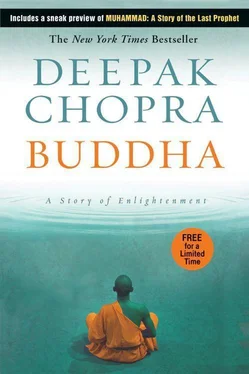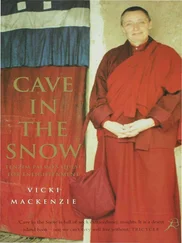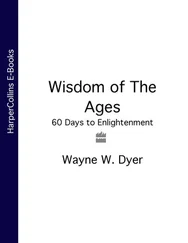“What is your name, beautiful one?” asked Gautama.
“Raga.”
“Your name means ‘lust.’ I was born a male, and therefore your appeal is well known to me. I will take you for a wife, but if we marry, you must respect my vows. Your heart of fire will be turned to ice, and you will never lust or be lusted after again. Is that acceptable?”
In an instant Raga was transformed into a ball of fire, which rushed at Gautama to sear his flesh. Instead, the fire passed through him and vanished.
“Show me your last daughter,” Gautama said. “The first two won’t have me.”
Mara jumped to his feet in a rage. “You treat my gentle girls badly. They only want to serve you, and in return you cruelly abuse them.”
“But your third daughter is so beautiful, I can’t possibly mistreat her. Bring her to me. I’m sure we will be married,” Gautama said gently. Mara regarded him with dark suspicion but made a small gesture. The third daughter knelt before them.
“Don’t ask me my name,” she said. “I am free of all desire and lust. I am as indifferent to you as you are to me. We are perfectly matched.”
“You’re very subtle,” said Gautama. “But I already know your name. It’s Arati, or ‘aversion.’ You want nothing because you hate everything. I will make you my wife, but only on the condition that you open yourself to love. Is that acceptable?”
Arati’s face assumed a look of unspeakable disgust. In alarm Mara reached his arms out to hold on to her, but he was too late. In an instant she vanished like the others. The demon gave a howl that grew louder and fiercer until it filled the whole forest. He swelled in size, and the form of Ganaka dropped away. Mara began to grow his four horrible faces.
“I’m going to see you as you really are. Good,” said Gautama.
“Arrogance!” Mara screamed. “You shall see me, all right, and the moment you do, you will die.”
He began to make mysterious signs in the air that Gautama didn’t understand, and like magic, the kingdom of the demons descended to earth. The forest floor crawled with poisonous snakelike demons, slithering over Gautama’s lap, while batlike demons tried to bite his face. A phalanx of elephants crashed through the trees, trampling other demons of damned souls whose bodies were crushed underfoot. Because the demon world consists of the most disgusting and terrifying forms that the human mind can conceive of, there was no end to the waves of Mara’s subjects that emerged in the moonlight.
Mara himself rode a massive bull elephant that held writhing souls between its jaws. At first he remained aloof, waiting for his army to annihilate Gautama by sucking it into a maelstrom of torment. But when he saw the calmness of Gautama’s gaze, Mara became agitated.
“Resist me all you like. I will never depart from you, and neither will my subjects. This spectacle is what you will see for the rest of your life.”
“I am not resisting. You are all welcome to stay,” said Gautama. “You cannot attack what isn’t here, and I am not here.”
“Not here?” said Mara. “You’re insane.”
“Or perhaps I just lack a soul. Doesn’t it take a soul to be damned?”
The calmness of Gautama’s speech not only infuriated the demon king but caused his subjects to begin to fade away like shadow puppets on a screen or summer lightning inside a cloud.
“Prove it to yourself,” said Gautama. “If you can find my soul, it’s yours. I have stopped caring, myself.”
Mara leaped from the elephant and crouched on the ground in front of Gautama. “Done!” he hissed. He had never experienced any creature, mortal or divine, without a soul, and now this fool had freely surrendered his. “You’re mine, and I will claim you when it pleases me.” Every other spectre had disappeared by now. Mara’s four malignant faces lingered for a few more seconds before he too vanished.
Gautama doubted he would ever see him again. The existence of his soul, like everything else, held no interest. Total detachment is the one great healer of karma. Yet the whisper of desire softly said, “Do not kill me. Have pity. Let me know even your slightest wish.”
He looked up and remembered the moon, which was perfectly full as it floated above the jungle canopy.
“Let me become the moon,” Gautama replied. “I have nothing to wish for down here.”
He had only wanted to have sway over his own destiny. It was the simplest of human wishes, yet it had been a source of fear and uncertainty his whole life. Everyone had told him, directly or indirectly, that it was impossible. Gautama felt a slight resistance even now, as if the gods would destroy him on the spot for usurping their power. Instead, he felt the last veil fall away from his mind, a sensation a hundred times more delicate than dropping a layer of gossamer. Then he became the moon and experienced what the moon experienced. It was impossible to put into words: a cool serenity that thrilled at its own existence. A concern for nothing but light itself. Gautama was aware of all these ingredients, yet the thing itself was ineffable.
The moon seemed to know that he had arrived, and he felt it bow down. I have waited. His gaze searched the sky, and these words seemed to come from everywhere, not just the moon but also the stars and the blackness between the stars. His heart began to swell.
I have waited too.
The sky bent down to envelop him. Now he understood why he had to become a nonperson. He had to be naked. Only in innocence does the mask fall away. So this is it, he thought. The truth. Gautama gave his heart permission to swell beyond the sky. He didn’t know what lay beyond, or how far he could go. He had found his freedom, and in freedom everything is permitted.
The sun rose, and Gautama found himself sitting on the soft, springy ground under the pipal tree. He got to his feet and tried walking. It was a strange experience-as he passed through the forest, the forest seemed to pass through him. Its breath mingled with his; its trees and vines extended from his body. He could feel the wind blowing through the swaying canopy overhead.
Gautama knew that everything had changed permanently. From now on, living in the physical world would be like dreaming. He could make things appear and disappear as easily as a dreamer does. A castle made of gold or a circle of angels around his head, stars exploding into bursts of white light or a deer nestling in his lap to sleep-they all appeared instantly at the hint of a thought.
Now he could sit under the pipal tree, silent and unmoving, and never return to the world. His journey was complete. But he still had a choice. To leave or stay?
Everyone from his past had given up on him long ago. And if he suddenly reappeared, how would he explain what he had become? The priests would certainly call him a fraud. Great souls are safe only as long as they stay put in the scriptures.
Gautama’s choice weighed heavily on him. Several mornings he felt that someone was thinking about him. Yashodhara. When her name came to him, Gautama saw her clearly. His wife was sitting alone in her room, mending a hem by the light of an open window. Gautama had seen her face many times during his wandering, but this was different. He was in the room with her, feeling her yearning, which was always for him. One person hadn’t given up.
Gautama thought of other people and found them as well. Channa was saddling a roan warhorse in the stables, and Gautama sensed that he was now master there; old Bikram had died. Suddhodana was asleep, alone with the drapes drawn. He was trying to escape a bad dream about an old battle.
Gautama could be anywhere and everywhere he wanted. Just by thinking of people, he could touch their minds. Not everyone would listen. Not everyone would feel his touch, but for a moment their troubles would ease. Is that what a Buddha did? Without warning, he started weeping. He was no longer husband, lover, or friend. He was a new Buddha, untried, wobbly, three days out of the womb. But he had no doubt that Gautama no longer existed.
Читать дальше












